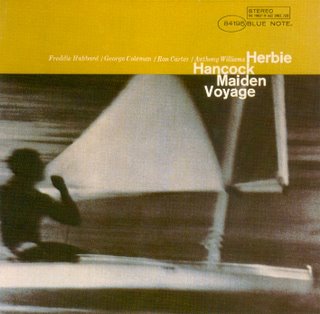
HERBIE HANCOCK
Maiden Voyage
Blue Note 84195
Recorded 1965
1. Maiden Voyage
2. The Eye Of The Hurricane
3. Little One
4. Survival Of The Fittest
5. Dolphin Dance
PERSONNEL
HERBIE HANCOCK; piano
FREDDIE HUBBARD; trumpet
GEORGE COLEMAN; tenor sax
RON CARTER; bass
TONY WILLIAMS; drums
Of the early Hancock Blue Notes, this 1965 LP is often regarded as the best realised in terms of Hancock's post-bop vision. Actually, it's simply his least funky of the period, and the one most influenced by Hancock's parallel existence as a member of Miles Davis' group.
It's actually a concept album based around the idea of the sea - Hancock's intention was to "evoke everything in the ocean: the flow of the current; the creatures, great, small and mythical, who live in the water; the response of voyagers, who experience it for the first time". He certainly gets close to that on several tracks - the furious "Eye Of The Hurricane" suggests an angry storm brewing, while the meandering, pretty 'Little One' might be a shoal of brightly coloured tropical fish swimming past.
The whole quintet produce great performances - hardly surprising, since four-fifths of this line-up had played together many times along with Miles Davis a few years earlier. If the group is a meant to be all at sea, then Coleman is the anchor - his steady tone and lyrical, bop-based solos anchoring the ensemble to jazz tradition. The others take it in turns at the helm, with Hancock and Hubbard the captain and first mate respectively. Hubbard blows with intensity in many places, making an especially good job of 'Eye Of The Hurricane' with torrents of notes pouring out like Coltrane on the trumpet. Down in the engine-room, Carter and Williams keep up the forward propulsion, for the most part at least - in 'Little One' the engine is ticking over, Williams especially losing momentum and letting the piece drift a little too much. Hancock's piano comes to the rescue and closes out the tune beautifully, but the damage has been done, and it's the lowpoint of the album for me (if that tune was released today on ECM records, it would fit very well).
Otherwise, Williams acquits himself well (as usual). I'm constantly amazed at how he can keep momentum and drive going while being inventive enough never to revisit anything he's already played. I've spent a lot of time listening to his playing of this period, and up until about 1969 I don't think he repeats a phrase even once (OK, that's a bit of an exaggeration).
Simply put, this is a superb listen. Another milestone on the post-bop highway which should be a cornerstone of any jazz collection.


No comments:
Post a Comment